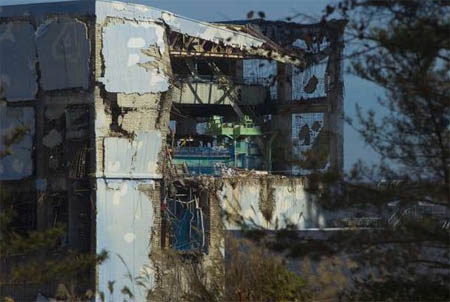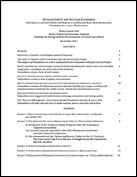Report: U.S. nuclear renaissance unlikely after Fukushima
December 28, 2011
Money & Company
Los Angeles Times

A new study released Wednesday said that the regulatory fallout from the Fukushima power plant disaster in Japan in March will short-circuit the U.S. nuclear renaissance of new power plant construction.
The report, "Nuclear Safety and Nuclear Economics," was written and presented by Mark Cooper, a frequent critic of the nuclear power industry. The report can be found here. Cooper is a senior fellow for economic analysis at the Institute for Energy and the Environment at the Vermont Law School.
Cooper said that past nuclear disasters, such as the one at the Three Mile Island power plant in Pennsylvania in 1979, have tended to greatly raise regulatory barriers and have also severely multiplied the cost of reactor construction. After Three Mile Island, for example, the report said, the cost of nuclear power plant construction doubled in most cases and trebled or quadrupled in some rare instances.
"This is an important moment to compare what is really likely to happen over the next 10 years with the industry’s expectations" of a nuclear renaissance, said Peter Bradford, an adjunct professor specializing in nuclear power and public policy at the Vermont Law School and a former Nuclear Regulatory Commission member.
"When that comparison is performed properly, it becomes clear that we are witnessing not a revival but a collapse in expectations for new reactor construction," Bradford added.
The report comes just days after a panel appointed by the Japanese government released a scathing assessment of the reponse to the disaster, which was caused when a huge earthquake generated a tsunami that struck the facility.
The investigative panel blamed the central government and the Tokyo Electric Power Co., saying both seemed incapable of making decisions to stem radiation leaks as the situation at the coastal plant worsened in the days and weeks after the disaster.
A recently updated online report by the World Nuclear Assn. said that as few as four of the 26 new nuclear facilities that have been proposed or planned in the U.S. will be finished by 2020. But it did not mention Fukushima and instead said the primary reason was the fact that a boom in domestic natural gas production has "put the economic viability of some of these projects in doubt."
 |
NUCLEAR SAFETY AND NUCLEAR ECONOMICS: HISTORICALLY, ACCIDENTS DIM THE PROSPECTS FOR NUCLEAR REACTOR CONSTRUCTION; FUKUSHIMA WILL HAVE A MAJOR IMPACT MARK COOPER, PHD Senior Fellow for Economic Analysis Institute for Energy and the Environment, Vermont Law School December 2011 Download report |
This document contains copyrighted material whose use has not been specifically authorized by the copyright owner. SEED Coalition is making this article available in our efforts to advance understanding of ecological sustainability, human rights, economic democracy and social justice issues. We believe that this constitutes a "fair use" of the copyrighted material as provided for in section 107 of the US Copyright Law. If you wish to use this copyrighted material for purposes of your own that go beyond "fair use", you must obtain permission from the copyright owner.


